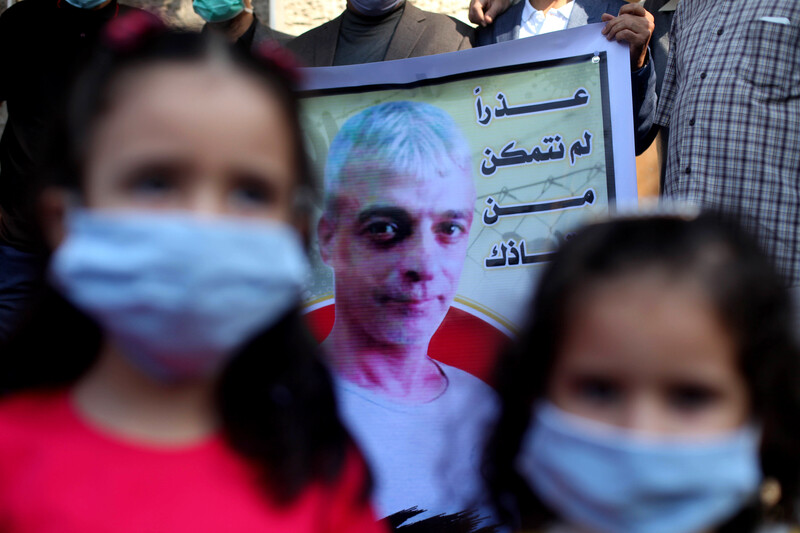Rights and Accountability 13 November 2020

Palestinians in Gaza City rally against the death of Palestinian prisoner Kamal Abu Waar in Israeli detention, on 11 November.
APA imagesA Palestinian prisoner died on Tuesday after 17 years in Israeli detention.
Kamal Abu Waar, 46, died at the Shamir Medical Center in Tel Aviv. He was diagnosed with throat cancer last year.
Abu Waar was being held at the Gilboa prison in northern present-day Israel when he tested positive for the virus that causes COVID-19 in July.
He had recently been transferred between several Israeli hospitals and also underwent surgery to insert a breathing tube into his throat.
Eventually, he was taken to the Ramle prison clinic, dubbed the “slaughterhouse” by prisoners due to its inadequacy as a medical facility.
Palestinian prisoners group Addameer has previously invited the World Health Organization to visit prison clinics “in order to document the inadequate level of health care” following the death of a Palestinian prisoner in 2018.Abu Waar was born in Kuwait in 1974 and later moved to the occupied West Bank and lived in the village of Qabatiya south of Jenin.
During the second intifada, in 2003, Israeli forces captured Abu Waar and accused him of involvement in the killing of an Israeli soldier, his friend Basel Kataneh told UK publication The New Arab.
The Palestinian Prisoners Club said he was part of Yasser Arafat’s elite Force 17 at the time.
The group said he was harshly interrogated by Israeli authorities for 100 days before being handed multiple life sentences and 50 additional years.
Palestinians rallied in Gaza and the occupied West Bank against his death and the conditions of Palestinian prisoners in Israeli jails during the pandemic.
Abu Waar’s family opened their home in Qabatiya to condolences even though the Israeli authorities are withholding his body, denying relatives the right to bury him. His family told The New Arab that Israeli prison authorities had prevented them from seeing Abu Waar in the last few months before his death.His body was transferred to Israel’s Abu Kabir Forensic Institute for an autopsy.
Abu Waar is the third Palestinian to die in Israeli detention this year. The other two, Daoud al-Khatib and Saadi al-Gharabli, were also longtime detainees.
Abu Waar’s death brings to 226 the number of Palestinians who have died in Israeli detention since 1967.
Outbreak in Gilboa
Gilboa, the prison where Abu Waar was being held, is the center of a coronavirus outbreak among Palestinian prisoners.
One hundred cases have so far been confirmed at the overcrowded prison.
Gilboa was also the subject of a petition filed by Palestinian legal advocacy group Adalah to Israel’s high court urging them to provide basic health services to Palestinian political prisoners – whom Israel calls “security” prisoners – at the prison.
Gilboa contains 450 prisoners, the vast majority of whom are Palestinian “security” prisoners.
The group warned of a “a real danger to the lives” of prisoners at Gilboa, citing overcrowding and lack of adequate hygiene. Multiple prisoners share each cell, which includes a small kitchenette and a shower box.
According to Adalah’s petition, overcrowding means prisoners cannot maintain a safe social distance to prevent the spread of the virus.
The court ruled that Palestinian prisoners have no right to physical distancing protection against the virus in prisons.
Its reasoning was that Palestinians under detention are like family members or flatmates living in the same house. On that basis, the court decided that the prison authorities were not obligated to provide means by which prisoners can practice physical distancing.
Myssana Morany, an Adalah attorney called this “fiction.”
“It’s not like a private home where I can tell the guards not to enter, in order to be careful,” Morany told Israeli daily Haaretz.
“The guards go in and leave, and also go home and return [to work]. It’s not like in a private space.”
In other words, the guards could introduce the virus in prisons.
“Continued disregard”
Now, what was feared is happening.
Approximately 20 percent of Gilboa’s “security” prisoner population has contracted the virus, including about 80 percent of a single wing.
Adalah sent a letter to Israel’s Prison Services questioning them on steps they have taken to ensure proper hygiene for prisoners, allow them to speak to their families and prevent the spread of the virus to other wards.
Gaza-based human rights group Al Mezan warned that the outbreak comes despite warnings of such an eventuality made by it and other human rights groups.
Al Mezan also reiterated Israel’s obligation under international law to ensure the health of Palestinian prisoners.
Israeli prison authorities are reportedly isolating infected prisoners in a separate section of the prison.
The Palestinian Prisoners Club said prisoners are forced to purchase masks and disinfectants at their own expense.
Israel is currently holding 4,500 Palestinian prisoners, including 170 children and 370 prisoners without charge or trial.




